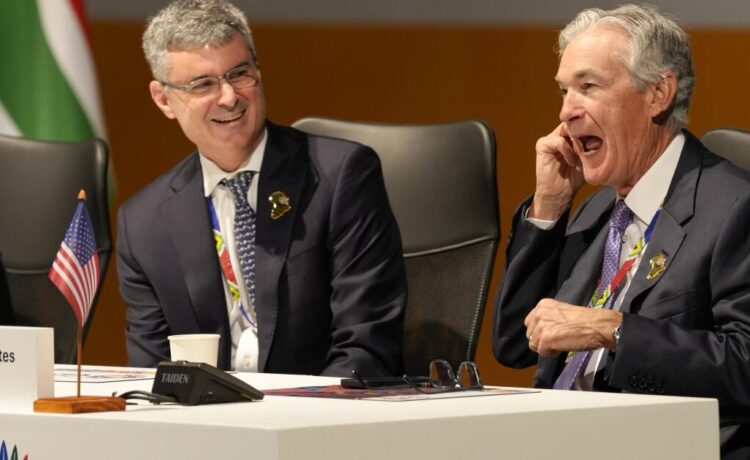CAPE TOWN, South Africa — Finance ministers and central bank chiefs from the Group of 20 developed and developing nations gathered in South Africa on Wednesday for a two-day meeting marked by the absence of U.S. Treasury Secretary Scott Bessent and several other high-profile figures.
Bessent’s absence follows a boycott of a G-20 foreign ministers meeting in South Africa last week by U.S. Secretary of State Marco Rubio as the Trump administration has been openly critical of the country and its G-20 themes. Bessent said he couldn’t attend because of commitments in Washington.
South Africa holds the rotating presidency of the G-20 this year — the first African nation to do so — and has pledged to put issues that especially affect poor countries like debt relief and climate change at the top of the agenda.
The G-20 is made up of some of the world’s major economies, the European Union and African Union. It represents more than two-thirds of the world’s population and approximately 80% of global GDP.
The finance ministers of China, Japan, India and Canada also weren’t expected to attend the meeting.
South African President Cyril Ramaphosa told delegates in Cape Town that his country’s G-20 priorities are strengthening resilience to climate-related disasters, addressing the debt burdens of poor nations, mobilizing finance for countries to transition to green energy and using critical minerals for the benefit of some of the developing countries where they are found.
The meeting “carries a weighty responsibility,” Ramaphosa said. “It needs to forge consensus on the actions we must take collectively to build a global economy that is more resilient, more sustainable and more equal.”
While many analysts had predicted U.S. President Trump would give little attention to international cooperation in the G-20 in favor of his “America First” policy, the Trump administration has been openly critical of South Africa and its priorities.
Rubio on social media has dismissed South Africa’s G-20 theme of solidarity, equality and sustainability as “DEI (diversity, equity and inclusion) and climate change.”
“My job is to advance America’s national interests, not waste taxpayer money,” Rubio wrote, pledging to also skip the main G-20 summit in South Africa in November.
Ramaphosa has invited Trump for a state visit for the G-20 summit, but there has been no response from the White House. The U.S. is next to take over the G-20 presidency.
U.S. Federal Reserve Chair Jerome Powell and European Central Bank President Christine Lagarde were in Cape Town. China sent its deputy finance minister and the deputy governor of its central bank.
The G-20 has struggled to come together and reach concrete consensus on many issues. The foreign ministers meeting last week, the first major G-20 event of the year, was marked by tensions over Russia’s three-year war with Ukraine.
British Foreign Minister David Lammy said Russian counterpart Sergei Lavrov walked out of a meeting at one point. The foreign ministers also didn’t pose together for a planned “family photograph” to mark the meeting. South African officials cited “scheduling difficulties.”
South Africa still hopes to find some consensus. On the eve of the latest G-20 meeting, the United Nations Development Program released a report saying debt problems had worsened for many countries, especially the poorest.
“If support for debt relief is not stepped up, the situation could easily morph into longer-term solvency crises in more countries,” the UNDP said.
Some analysts in Africa say the G-20 — a supposed bridge between rich and poor countries — is also for re-galvanizing a global climate agenda after Trump’s move to withdraw the U.S. from the Paris climate agreement. South Africa’s Institute for Security Studies said Africa and the rest of the developing world would be “the first victims” of reduced climate action.
Imray writes for the Associated Press.
















